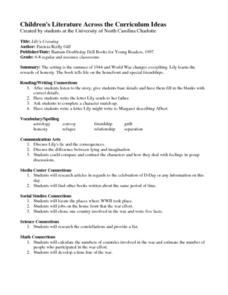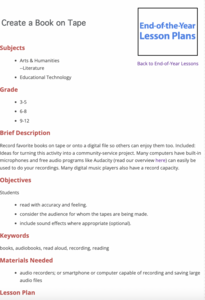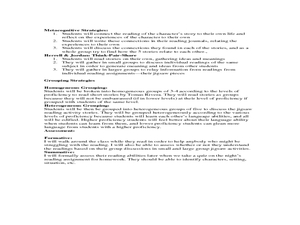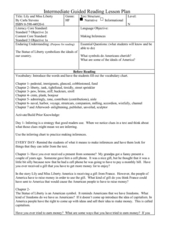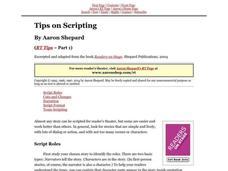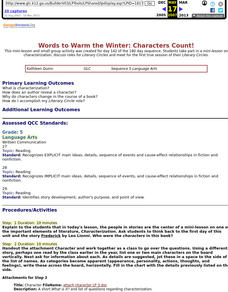Curated OER
Gingerbread Baby's Point of View #8
Read the story Gingerbread Baby and use these various activities to connect to grammar, art, and point of view. In one activity, learners create character masks. They practice writing verbs on the back of the masks to tell what each...
Curated OER
Writing Process
Students read "The Great Kapok" and choose to agree or disagree with the main character's decision. They gather and organize details from multiple sources to defend their standpoints. They begin prewriting steps of process writing.
La Jolla High School
Of Mice and Men: Looking at Themes
Feelings of loneliness and alienation drive the characters in John Steinbeck's novel Of Mice and Men. Use this handout to set your class members up for a lesson on these big ideas. In addition to finding a couple of definitions and...
Curated OER
Crossing the Delaware with Historic, Cultural, and Personal Interpretations
Sixth graders discover the importance of information sources by researching the United States History. In this research gathering lesson plan, 6th graders examine a historical painting of George Washington and analyze what it means,...
Curated OER
The Lion, the Witch, and the Wardrobe: Bio Poem
Get to know your learners on a deeper level or invite them to step into someone else's shoes by introducing them to a bio poem. With this type of poetry, scholars will answer questions such as self-description, hopes for the future, and...
Curated OER
Lily's Crossing
Students listen to a story, "Lily's Crossing," about life during a World War. After completing worksheets, they compare and contrast characters in the story. Using math skills, students develop a time line of the war, calculate the...
Curated OER
Detail Detective: Story Activity
In this story detail worksheet, students complete a graphic organizer, filling in details about a story read and what characters see, hear, smell, taste, touch and where they go.
Curated OER
The Kite Runner: The Pomegranate
To better understand the conflict between Amir and Hassan, two characters in Khaled Hosseini's The Kite Runner, readers assume the voice of one of the boys and craft a letter to the other that explains his feelings and concerns.
Curated OER
Create a Book on Tape
Learners of all ages record themselves reading their favorite books with accuracy and feeling. They must read with sound effects and consider the audience for whom the tape is being made. They are assessed based on the quality of their...
Curated OER
Hispanic and English Literature
Eleventh graders listen to a brief history lesson about the 40's and 50's mid-West America and the Migrant workers that worked the fields. Next, learners will read a short story written by Tomas Rivera (both in Spanish and English)....
Curated OER
“Everyday Use,” Alice Walker: Questions for Discussion
Should treasured family heirlooms be used or preserved? This resource provides readers with an opportunity to examine the actions of characters in Alice Walker’s short story, as well as their own sense of heritage. The questions could be...
Curated OER
On The Day You Were Born
Students engage in a study about the holiday of a birthday with the help of using children's literature. They make cognitive connections of using the characters of the book and relating them to the personal celebration of a birthday.
Curated OER
Lily and Miss Liberty
Students discuss ways to earn money and why they might need it. Students create crowns to wear all day like in the story. Students create a play using characters in the story. Students interview "eyewitnesses" at the unveiling of the...
Curated OER
So Foul and Fair a Play
Students watch various interpretations of Shakespeare's Macbeth in film. In groups, they examine the setting, characters, music and sequence. They compare and contrast the various films and discuss the differences. They write an essay on...
Curated OER
Introduce Vocabulary: Clap Your Hands
Read Clap Your Hands to explore new vocabulary with your class. In this three-tiered vocabulary lesson plan, youngsters read the book and identify the plot, setting, and characters. They also define vocabulary terms from the book and...
Curated OER
Picture Collage Book Report: Voltaire's Candide
Here's an alternative to a traditional book report for your class to demonstrate that they understand and can articulate the main character's evolution and the social themes presented in Voltaire's satirical novel Candide. Your young...
Curated OER
A Midsummer Night's Dream Acts 1-2
Blank verse, stichomythia, soliloquy, allusion, oxymoron, malaprop? Readers of A Midsummer Night’s Dream will need to know these terms to successfully complete a study guide designed for the first two acts of Shakespeare’s comedy. The...
Curated OER
Running Out of Time: Problematic Situation
What would you take with you if you were traveling on your own to a different place? A different time? Pupils decide individually and then in groups what the main character of Running Out of Time should take on her trip. Coming to a...
Curated OER
Their Eyes are Watching
Fourth graders create a character map for each character in the novel, adding to each as he or she is revealed in "Their Eyes Were Watching God." They document how each character deals with attitudes and injustices.
Curated OER
Mr. Peabody's Apples
Students read Mr. Peabody's Apples. In this reading instructional activity, students complete pre-and post-reading activities to improve comprehension skills. Students role play scenes from the story to analyze.
Curated OER
Respect
Students explore and discuss why Aretha Franklin's song "R-E-S-P-E-C-T" has been so popular over the years. They survey a variety of definitions and perceptions of what truly respect is and how one shows respect to others as well as how...
Curated OER
Speak What We Feel, Not What We Ought to Say
Young scholars examine and create their own interpretation of a particular character from the play, King Lear. They read the speeches, write a paragraph about their character, and present a short performance of their scene.
Curated OER
Words to Warm the Winter: Characters Count!
Fifth graders take part in a mini-lesson on characterization, discuss roles for Literary Circles and meet for the first true session of their Literary Circles.







